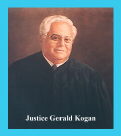Justice Kogan Believes
Innocent People Have Been Executed in Florida
By JACKIE HALIFAX
Associated Press
 TALLAHASSEE - Twenty-five people have died in Florida's electric chair in the 12 years Justice Gerald Kogan has served on the state Supreme Court. The retiring justice belives some of them may have been innocent.
TALLAHASSEE - Twenty-five people have died in Florida's electric chair in the 12 years Justice Gerald Kogan has served on the state Supreme Court. The retiring justice belives some of them may have been innocent.
"There are several cases where I had grave doubts as to the guilt of a particular person (and) other cases where I just felt they were treated unfairly in the system," Kogan said.
Kogan, who asked juries to recommend the death penalty as a Miami-Dade prosecutor, has long believed capital punishment isn't working. Since he was appointed to the Supreme Court in 1987 he has ruled on hundreds of capital case appeals.
In an interview last week, he said he wasn't convinced of the guilt of the condemned person in "two or three" capital capital cases that ended in executions.
Although he wouldn't say who he believed was innocent, Kogan said he voted to stop the executions. But he couldn't get a majority of the other justices to agree with him and no justice holds veto power over the others.
"You don't need a unanimous decision. Only a 4-3," he said.
Others won't discuss views.
Justice Ben Overton, who is retiring early next year after 24 years on Florida's high court, said he doesn't discuss his views on capital punishment. Chief Justice Major Harding also does not comment on the death penalty.
Kogan, who could stay on the Supreme Court another five years if he wanted, said he's ready for new challenges and has taken a job starting government in Miami-Dade County.
Before Kogan was appointed to the court, he worked as a prosecutor, defense attorney and trial judge in Dade. He estimated he's handled some 1,200 capital cases. As a prosecutor in the capital felony division, Kogan had to visit murder scenes, work with victim's families and ask juries to recommend death sentences.
However, he said he has long held that capital punishment "just doesn't work", even though executions may be warranted in some cases.
"I've had people say to me: "Oh, you bleeding-heart liberals," Kogan said. "And I say: Wait a minute....When I was with the homicide and capital crimes, one of our duties was to go to the scene of homicides and I have seen many a dead body under all sorts of circumstances."
A differing point of view.
But state Rep. Victor Crist, chairman of the House Criminal Justice and Corrections Council, said Kogan has been "on the record as being an adversary to capital punishment."
Despite Kogan's doubts, Crist's faith in the process is unshaken. "Do I think we've executed innocent people?" he said. "No."
He pointed to the length of the appeals process.
"Not one, not two, not five, not 10, but dozens of people have reviewed and rereviewed and rereviewed the cases before someone is executed in this state," said Crist, R-Temple Terrace.
Since the state resumed capital punishment in the late 1970s, after the U.S. Supreme Court lifted a four-year national moratorium on executions, Florida has executed 43 people.
Kogan cited research by Michael Radelet, a professor of sociology at the University of Florida and death-penalty opponent, who has documented 26 cases where Radelet believes innocent people were executed.
And since DNA evidence began making a difference in the last 10 years or so, 53 people across the nation have been released from Death Row, Kogan said.
"But how about...before we could rely upon DNA?" Kogan said. "What happened to those people?"
Kogan pointed to the millions of dollars spent on appeals that go on for years - with the state usually paying lawyers on both sides. He also cited the time it takes the Supreme Court to review every death sentence handed down in Florida and then every appeal. The seven justices spend anywhere from a quarter to half their time on capital cases even though they are just 3 percent of the case load.
Despite all that time and money, capital punishment doesn't stop murders, Kogan said. "When you compare those states with capital punishment to those states that don't have capital punishment, there's hardly any statistical difference at all."
For Kogan, there is one argument that is more compelling than any other - on either side of the debate.
"To me, the only valid reason...and the one that really rings true is the possibility of making a mistake and executing an innocent person," he said. "To take the life of an innocent person is indeed the most tragic thing that we can do."
Back to Mainpage
tsihle@online.no


 TALLAHASSEE - Twenty-five people have died in Florida's electric chair in the 12 years Justice Gerald Kogan has served on the state Supreme Court. The retiring justice belives some of them may have been innocent.
TALLAHASSEE - Twenty-five people have died in Florida's electric chair in the 12 years Justice Gerald Kogan has served on the state Supreme Court. The retiring justice belives some of them may have been innocent.